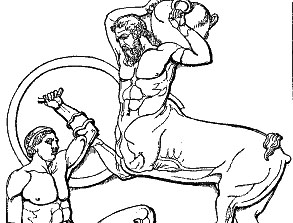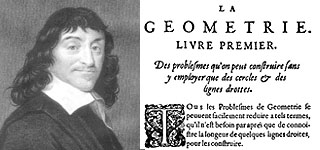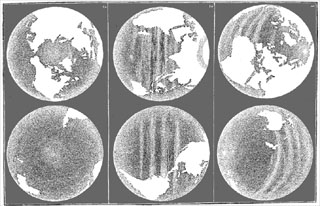The Reading Selection from The Nature of Truth
[Coherence as Conceivability]
We may start with the following as a provisional and rough formulation of the coherence-notion. "Anything is true which can be conceived. It is true because, and in so far as, it can be conceived. Conceivability is the essential nature of truth." And we may proceed at once to remove a possible misunderstanding of the term "conceive." We do not mean by "conceive" to form a mental picture; and we shall not be dismayed when we hear that the Antipodes were once "inconceivable," or that a Centaur can be "conceived." For it may be difficult—or even, if you like, impossible— to "image" people walking head downwards; and to "picture" a horse with the head and shoulders of a man may be as easy as you please. All this is quite irrelevant, and does not touch our position. To "conceive" means for us to think out clearly and logically, to hold many elements together in a connection necessitated by their several contents. And to be "conceivable" means to be a "significant whole," or a whole possessed of meaning for thought. A "significant whole" is such that all its constituent elements reciprocally involve one another, or reciprocally determine one another's being as contributory features in a single concrete meaning. The elements thus cohering constitute a whole which may be said to control the reciprocal adjustment of its elements, as an end controls its constituent means. And in this sense a Centaur is "inconceivable," whilst the Antipodes are clearly "conceivable." For the elements constitutive of the Centaur refuse to enter into reciprocal adjustment. They collide amongst themselves, or they clash with some of the constitutive elements in that wider sphere of experience, that larger significant whole, in which the Centaur must strive for a place. The horse-man might pass externally as a convenient shape for rapid movement; but how about his internal economy, the structure, adjustment and functioning of his inner organs? If he is to be "actual," the animal kingdom is his natural home. But if we persisted in our attempt to locate the creature there, we should inevitably bring confusion and contradiction into that sphere of significant being— so far at least as it is manifest to us in our anatomical and physiological knowledge. And, on the other hand, the being of the Antipodes is a necessary interconnected piece in that puzzle of which our astronomical science is the coherent exposition. The Antipodes are "conceivable" in the sense that they are forced upon any thinker for whom the earth and the solar system are to possess significance; i.e., the Antipodes are a necessary constituent of a significant whole, as that whole must be conceived.[1]

Centaur from the Parthenon, (detail) William Smith, A History of Greece.
[Coherence as Science]
Thus "conceivability" means for us systematic coherence, and is the determining characteristic of a "significant whole." The systematic coherence of such a whole is expressed most adequately and explicitly in the system of reasoned knowledge which we call a science or a branch of philosophy.[2] Any element of such a whole shares in this characteristic to a greater or less degree—i.e. is more or less "conceivable"—in proportion as the whole, with its determinate inner articulation, shines more or less clearly through that element; or in proportion as the element, in manifesting itself, manifests also with more or less clearness and fullness the remaining elements in their reciprocal adjustment.
…Truth, we have said, is in its essence conceivability or systematic coherence…
We spoke of science as an explicit analysis and reasoned reconstruction of the systematic coherence of a significant whole; but this sounds uncommonly like a reversion to the correspondence-notion. Science would be "true," so far as its system of demonstrations reconstructs—i.e., repeats or corresponds to—the systematic coherence which is the truth as a character of the Real.
Moreover, we have admitted degrees of conceivability, and therefore also degrees of truth. But we have not explained, and perhaps could not explain, the ideal of perfect conceivability and perfect truth by reference to which these degrees are to be estimated.
…let me endeavour to throw further light on the theory just sketched, by contrasting it with two very different views to which it bears some superficial resemblance.
(i) [Descartes' Clear and Distinct Ideas]
When Descartes laid it down as a principle for the seeker after truth "to affirm nothing as true except that which he could clearly and distinctly perceive," he was in reality presupposing a very definite theory of knowledge…The content of such an "intuition," viz. that which we apprehend intuitively as self-evident, is a "simple idea" or rather (as Descartes sometimes[3] more clearly expresses it) a "simple proposition." Its "simplicity" does not exclude inner distinction; for it is the immediate, but necessary, cohesion of two elements or two constituent ideas. In other words, the self-evident datum, which Descartes calls a "simple idea" or a "simple proposition," is a hypothetical judgment so formulated that the antecedent immediately necessitates the consequent, though the consequent need not reciprocally involve the antecedent.[4]

René Descartes and La Geometrie, Thoemmes
The elements in the content of an "intuition" cohere by the immediate necessity which binds consequent to antecedent in a hypothetical judgement of the kind explained. But the content as a whole is grasped intuitively, or immediately, as an indubitable self-evident datum. Such self-evident indubitable truths constitute the foundation on which the structure of scientific and philosophical knowledge is built. There are the principles, from which the whole system of demonstrated and demonstrable truth must be derived.[5] And this system is, so to say, a network of chains of propositions. The links in each chain form an uninterrupted sequence from its first link. They follow with unbroken logical coherence from a self-evident datum, a "simple proposition" apprehended intuitively. Each derivative link is grasped by the intellect as the necessary consequent of a link or links intuited as indubitable truths, and as thus grasped itself is manifest as an indubitable truth.
Thus the ideal of knowledge for Descartes is a coherent system of truths, where each truth is apprehended in its logical position: the immediate as the basis, and the mediate truths in their necessary dependence on the immediate. Each truth in this ideal system is a cohesion of different elements united by a logical nexus; and every truth is true per se absolutely and unalterably.
[Coherence Is the Organized Whole]
But the theory which I am trying to expound is committed, for good or for evil, to a radically different view of the systematization of knowledge. The image of a chain, admirably suited to illustrate the theory of Descartes, is a sheer distortion of the conception of "coherence" or "conceivability," which, on my view, characterizes truth. The ideal of knowledge for me is a system, not of truths but of truth. "Coherence" cannot be attached to propositions from the outside: it is not a property which they can acquire by colligation, whilst retaining unaltered the truth the possessed in isolation. And whereas for Descartes ideally certain knowledge (indubitable truth) is typified in the intuitive grasp of the immediately cohering elements of a "simple proposition," such a content is for me so remote from the ideal as hardly to deserve the name of "truth" at all. For it is the smallest and most abstracted fragment of knowledge, a mere mutilated shred torn from the living whole in which alone it possessed its significance. The typical embodiments of the ideal must be sought, not in such isolated intuitions, but rather in the organized whole of a science: for that possesses at least relatively immanent and self-contained.
(ii) [Consistency of Formal Logic]
The second view with which I propose to contrast the coherence-theory may be regarded as a corollary of the first.[6] For, if there are certain judgements indubitably true, then these are the materials of knowledge. And, in the progress of thought, a form is imposed upon these materials which arranges without altering them. Truth is linked to truth until the arrangement constitutes that network of chains of truths which is the system of ideally complete knowledge. The form under which the infinitely various materials are ordered, is the universal form of all thinking. It is the characteristic grey of formal consistency, which any and every thinking monotonously paints over all its materials to stamp them as its own. For false materials, as well as true, may be painted with the royal colour. but the result cannot be true without this arrangement, which is thus a sine qua non of a "negative condition" of truth. We may christen the observance of this condition "validity"; and we may then draw the conclusion that the completely true must also be valid, though the valid may be false. Or if we prefer the term "consistency" we shall point out that consistent lying and consistent error are occasionally achieved, and that a man may be a consistent scoundrel; but that the truth requires for its apprehension and utterance the same consistency of thought and purpose, which must also be expressed in the action of the morally good man. The consistent, in short, need be neither true nor good; but the good and the true must be consistent.
…And the formal logician has followed a sound instinct in emphasizing the necessity of analysing and grasping this unity, if thinking is to understand itself. But he has erred in looking for the unity as an abstract common feature, to be found in the actual processes of thinking by stripping them of their concrete differences. And it is the same error which has led him to conceive thinking as a dead and finished product instead of a living and moving process. In the end and in principle his error is the failure to conceive a universal except as one element along with others in particular: a failure which is tantamount to the negation of all universals. Or it is the failure to conceive a whole except as the sum of its parts: a failure which is the denial of unity and individual character to that which develops and lives. Hence formal logic assumes that the essential nature of thought is to be found in an abstractly self-identical form; in a tautologous self-consistency, where the "self" has no diversity of content in which a genuine consistency could be manifested, or where diversity of content is cast aside as mere irrelevant material. But the essential nature of thought is a concrete unity, a living individuality. Thought is a form, which moves and expands, and exhibits its consistent character precisely in those ordered articulations of its structure which formal logic impotently dismisses as "mere" materials.
The "systematic coherence," in which we are looking for the nature of truth, must not be confused with the "consistency" of formal logic. A piece of thinking might be free from self-contradiction, might be "consistent" and "valid" as the formal logician understands those terms, and yet it might fail to exhibit that systematic coherence which is truth.
[Coherence Theory of Truth]
We may now proceed to formulate the coherence-theory afresh in the following terms. Truth in its essential nature is that systematic coherence which is the character of a significant whole. A "significant whole" is an organized individual experience, self-fulfilling and self-fulfilled. Its organization is the process of its self-fulfilment, and the concrete manifestation of its individuality. But this process is no mere surface-play between static parts within the whole; nor is the individuality of the whole, except in the movement which is its manifestation. The whole is not, if "is" implies that its nature is a finished product prior or posterior to the process, or in any sense apart from it. And the whole has no parts, if "to have parts" means to consist of fixed and determinate constitutents, from and to which the actions and interactions of its organic life proceed, much as a train may travel backwards and forwards between the terminal stations. Its " parts" are through and through in the process and constituted by it. They are "moments" in the self-fulfilling process which is the individuality of the whole. And the individuality of the whole is both the pre-supposition of the distinctive being of its "moments" or parts and the resultant which emerges as their co-operation, or which they make and continuously sustain.
It is this process of self-fulfilment which is truth, and it is this which the theory means by "systematic coherence." The process is not a movement playing between static elements, but the very substance of the moving elements. And the coherence is no abstract from imposed upon the surface of materials, which retain in their depths a nature untouched by the imposition. The coherence—if we call it a "form"—is a form which through and through inter-penetrates its materials; and they—if we call them "materials"—are materials, which retain no inner privacy for themselves in independence of the form. They hold their distinctive being in and through, and not in sheer defiance of, their identical form; and its identity is the concrete sameness of different materials. The materials are only as moments in the process which is the continuous emergence of the coherence. And the form is only as the sustained process of self-fulfilment, wherein just these materials reveal themselves as constitutive moments of the coherence.
In the above formulation I have endeavoured to express the coherence-notion so as to emphasize the concreteness of the coherence which is truth, as against the view which found truth in formal consistency; and I have insisted upon the conception of truth as a living and moving whole, as against the Cartesian view of fixed truths on which the structure of knowledge is built.

Earth's Antipodes from Space, Amédée Guillemin, The Heavens: An Illustrated Handbook of Popular Astronomy, 1871